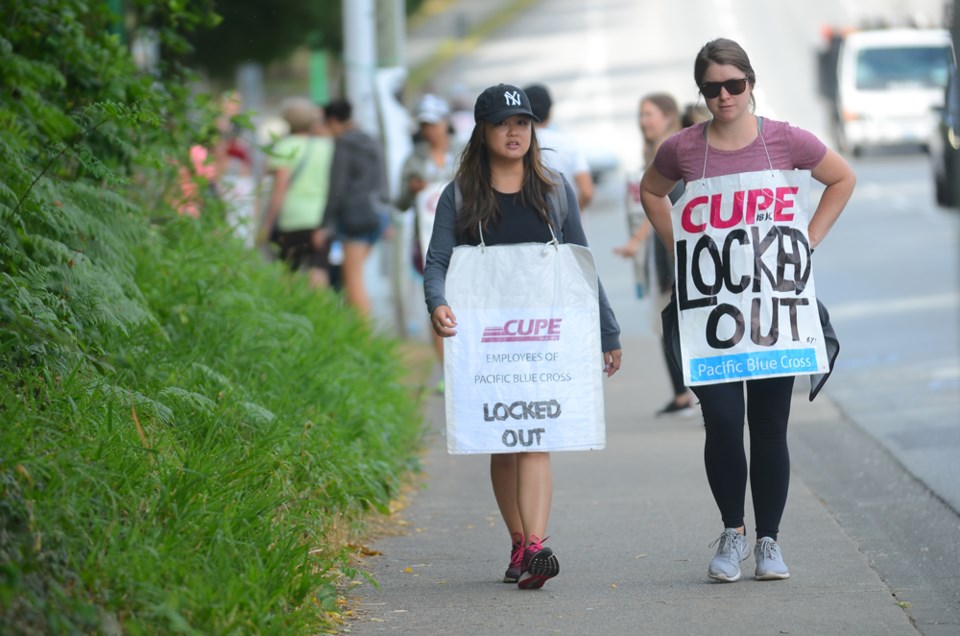The union representing more than 600 Pacific Blue Cross (PBC) workers is heading to mediation on Sept. 8 and 9, two months after members were locked out.
CUPE Local 1816 and the Burnaby-based benefits provider started contract negotiations last September, and after more than a dozen meetings, they remain at an impasse on wages and retiree benefits.
The non-profit is looking to claw back retiree benefits, according to union president Beth Miller, who has been in the role for 20 years.
“We have never ever experienced this kind of labour unrest. We’ve always managed to get a collective agreement. But the CEO has really dug in on this not happening,” she said. “This is just the start. The employer doesn’t want to be obligated to paying this. They take it down now, and down the road, they’re just going to keep chipping away, and eventually, we won’t have any retiree benefits.”
Miller pointed to what she called a “cultural shift” that happened in 2013, when Pacific Blue Cross appointed Jan Grude as its president and CEO.
“It was more or less a family-oriented culture and now it’s more corporate,” she said. “The CEO wants nothing to do with retiree benefits. ... Jan has a record of cutting back and privatizing.”
At one point in negotiations, Pacific Blue Cross wanted to roll back retiree benefits for both current and retired employees. The latter was eventually taken off the table, Miller said, because “it was illegal for them to do.”
“You cannot claw back benefits for people who are already retired.”
Heidi Worthington, PBC’s senior vice-president, told the NOW the cutbacks are needed. (Grude was not available for an interview.)
The cost of the retiree benefits plan will rise in the future, she said, at a rate of seven to eight per cent.
“Our plans for both our active staff and our retiring staff are very, very generous. They are best in class and they are very expensive for the employer, so what we’re trying to do is make reasonable changes now so we can afford them for many years to come.”
Worthington said Pacific Blue Cross wants to add features into the plan that will better deal with increasing costs, including asking members to shop within a preferred pharmacy network.
“That’s one where we have negotiated limits to margins and markups, so that drug costs are more manageable,” she explained.
Another cost-saving measure includes having incentives for members to use low-cost alternative and generic drugs rather than brand names.
After hiring an actuary to look at Pacific Blue Cross’s finances, the company can very well afford the retiree benefits as is, according to Miller.
The union president said current service costs for retiree benefits amount to $914,000, around two per cent of the total payroll. The company would save less than one per cent of payroll in current service costs if their concessions were granted, she said, adding Pacific Blue
Cross had a net profit of nearly $11 million in 2016. (As a non-profit organization, any financial surplus Pacific Blue Cross generates is reinvested into the business.)
“If there’s a crisis at PBC, it’s not a financial crisis, it’s a crisis of leadership,” said Miller.
When asked about the positive financials, Worthington said, “the finances of the organization have been fully disclosed with the union leadership, so they have access to all of our financial information to see where we’re at currently and what we’re projecting for the future. The main focus for us is sustainability in the future. That’s where we see a considerable acceleration of costs that concerns us.”
Job action started on May 2, when the union started rotating departments on the picket line to not disrupt service. On June 30, Pacific Blue Cross advised the local that further job action would result in employees not being allowed to return to work. Building access was taken away July 7.
Pacific Blue Cross provides health, dental, life and disability coverage for more than two million people, and union members working primarily in education, government, health care and municipal government, including City of Burnaby employees.
Coun. Colleen Jordan sits on PBC’s board of directors. When reached for comment via email, Jordan said she couldn’t comment on the matter as a sitting director.
Mediation will be provided by Vince Ready.
Making a claim
During job action, Pacific Blue Cross members can still make a claim on their cellphones and receive payment within hours. Members can sign in online or through the mobile app to view coverage and claims statements. Meanwhile, paper claims are still being processed at 4250 Canada Way (open from 8 a.m. to 4:30 p.m. Monday to Friday). There may be a wait though, as management is processing claims based on need and priority. For more information, visit pac.bluecross.ca. The union at one point was asking members and allies to file paper claims to support their job action.



